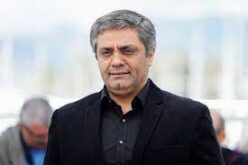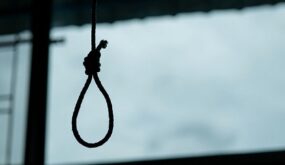CHRI – Almost anywhere else, it wouldn’t have been a big deal. But because she’s based in the Islamic Republic of Iran, prominent Iranian actress Taraneh Alidoosti made international headlines when she, for the first time, posted a photo of herself on her Instagram page without the state-mandated compulsory headscarf.
“Woman! Life! Freedom!” reads the sign in her hands, the central slogan of Iran’s growing protest movement for social and political change.
“Your final absence, the migration of voices, will not be the end of this turmoil!” said the caption attached to her post, an apparent reference to the death of Mahsa (Zhina) Amini in state custody and other victims of state violence.
Katayoun Riahi, another top Iranian actress, was the first among her peers to post a photo of herself online without a headscarf “to mourn the women of my country” on September 18, 2022—two days after Amini’s death, when protests were erupting around the country.
Both based In Iran, where the film and music industries operate under arbitrary rules and restrictions imposed by the state, the actresses are aware of the risks they’ve taken by defying the government’s forced-hijab law, including never being able to work again.
“For years, almost all the production companies making home movies and TV series have become financially dependent on the government, making it easy for the security establishment to control those working in the industry,” a film director in Tehran, who requested anonymity for personal security reasons, told the Center for Human Rights in Iran (CHRI).
“Many of my colleagues, actors, writers, stage designers, and so on have been threatened by producers and investors tied to the state that they will lose their job if they continue to support the popular uprising,” said the director.
“Now discussion is focused on film and TV productions that are in the final stages,” added the director. “The recent comments made by the actors/actresses have cast doubt on whether [the productions] will ever be aired.”
“Keep in mind that the International Fajr Film Festival is approaching (February 2024) and under the current circumstances, I think it’s unlikely that it will be held at all,” the director told CHRI. “The future of cinema is completely tied to politics and changes in the country.”
On November 14, 2022, the Shargh newspaper in Iran reported that more than 100 artists in the film, theater, and music industry have been detained, banned from working, or prohibited from leaving the country for either expressing support for Iran’s protest movement or joining it.
“The list includes 10 documentarians who were tangled with the courts before [the protests] for taking part in workshops abroad,” Alireza Hojjati, a board member of the Iranian House of Cinema told Shargh.
“Also, there are six names on the list from the film industry who issued statements [that were critical of the government] and 26 names from the music and theater community,” added Hojjati. “Some of the detainees are scriptwriters, assistant cinematographers, short-film makers, and documentarians. They’re mostly young…”
Meanwhile, many production companies owned by the state, or that have signed lucrative state contracts, have quietly severed their ties with outspoken artists.
“There might be more people banned from work because usually they don’t publicize it,” said Mehdi Kouhian, a film producer.
“Right now, nothing is being produced so it’s not clear who’s been banned,” Kouhian added. “But we know some contracts have been canceled and several people are not allowed to work in the industry anymore.”
According to research by CHRI, artists detained and/or prosecuted in Iran since September 16, 2022, when protests broke out, include the following individuals listed below.
These people, like all the 15,820 people who’ve been arrested in Iran since September 16, face prosecution without due process, denial of medical treatment, and torture aimed at extracting forced false “confessions.”
- Dissident rapper Saman Yasin, an ethnic Kurd from Kermanshah, western Iran. Charged with Moharebeh(waging war against the state), which could result in a death sentence, Yasin was arrested on October 10, 2022, and is currently in Tehran’s Evin Prison.
- Dissident rapper Saman Yasin Seyyedi has also been accused of Moharebeh. An ethnic Kurd from Kermanshah and a resident of Tehran, Seyyedi was arrested by state agents at his home on October 2, 2022, and after a few days was transferred to Tehran’s Evin prison. He started a hunger strike on November 15.
- Dissident rapper Toomaj Salehi has been detained since his arrest on October 30, 2022. His location is unknown.
- Director and film editor Nik Yousefi has been detained in Tehran’s Evin Prison since October 16, 2022.
- Theater director Amirhossein Barimani has been sentenced to five years in prison. Held in the Greater Tehran Central Penitentiary (GTCP) or Fashafoutyeh Prison), the university student was arrested by state security agents in front of his home on November 14, 2022.
- Musician Mahmoud Mirzaei is reportedly in poor health with a broken rib in the Greater Tehran Central Penitentiary where he has been detained since October 4, 2022.
- Documentarian Mojgan Inanlou was arrested by state security agents, who raided her home and confiscated her phone and laptop. She has been in Tehran’s Evin Prison since her arrest on October 17, 2022.
- Theater director Karamollah Soleimani, from Gachsaran, southwest Iran was arrested on September 21, 2022, during a protest. His location is unknown.
According to a list published by the Iranian Wrister Association (IWA) on November 3, 2022, other artists who’ve been arrested since September 16 include:
- Atefeh Chaharmahalian, Poet
- Navid Seyyed Aliakbar, Writer/Translator
- Mojgan Kavousi (a former political prisoner), Translator
- Saeid Hilchi, Poet/Translator
- Mandana Sadeghi, Poet/Journalist
- Reza Mohammadi, Poet/Writer
- Behrouz Yasami, Poet/Literary Critic
- Amir-Hossein Atash, Poet
- Behnaz Amani, Writer/Translator
- Arash Ramazani, Poet
- Yousef Gerami, Poet/Labor Activist
The IWA report also noted that Nasibeh Nami, a poet detained since October 30, 2022, was transferred from Gachsaran to the Central Prison in Yasouj in poor health after being subjected to torture.
After being denied proper medical treatment after contracting COVID-19 in Tehran’s Evin Prison, poet Baktash Abtin died in state custody in January 2022. The Iranian government refused to allow an independent investigation into his death and never held anyone accountable.
The state prison’s organization and the judiciary to which it reports are legally responsible for the safety and security of prisoners in Iran, yet they continue to refuse prisoners, particularly political prisoners, proper medical treatment.
Among the more than 16 prominent members of Iranian civil society who were arrested in a crackdown on dissent in July 2022 were three film directors: Mohammad Rasoulof, Mostafa Aleahmad, and Jafar Panahi.
Rasoulof and Aleahmad were arrested on July 8 after being accused of “inflaming passions and disturbing people’s psychological security” by launching the “Lay Down Your Gun” social media campaign calling on state security forces to stop opening fire on street protesters. Aleahmad was released on bail on August 10.
The “Lay Down Your Gun” campaign was backed by 100 members of Iran’s film industry who had signed a joint statement on May 8.Two days later, Panahi was arrested on July 10 as he was making inquiries about the arrest of Rasoulof, who had a one-year prison sentence reinstated against him.
Panahi was then ordered, on July 19, to serve a six-year prison sentence issued against him in 2011 for making films that criticized state policies.
Panahi, who had also endorsed the “lay down your gun” campaign, was among rights activists and lawyers who had sought to file a lawsuit against Supreme Leader Ali Khamenei and other senior officials for their gross negligence during the COVID-19 pandemic.
*Click here to read CHRI’s recommendations to the international community to help end the Iranian government’s violent suppression of protests in Iran.
 Shabtabnews In this dark night, I have lost my way – Arise from a corner, oh you the star of guidance.
Shabtabnews In this dark night, I have lost my way – Arise from a corner, oh you the star of guidance.



